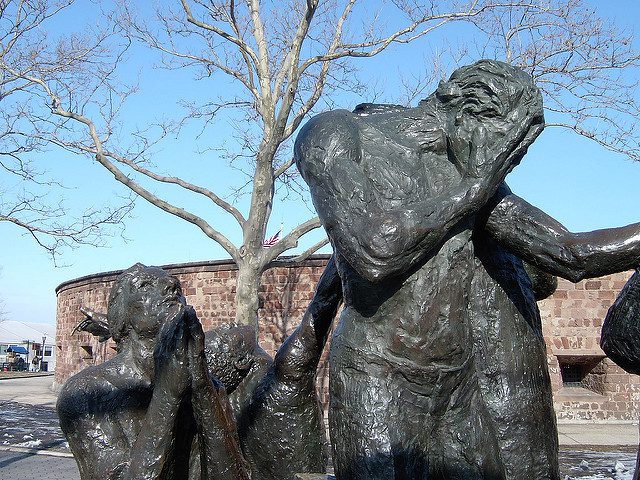
The Nobel Peace Prize winner and Holocaust survivor Elie Wiesel said that there is no such thing as an illegal human being. While one might cross a border without legal sanction, that does not make one an illegal human. Wiesel declared,
You, who are so-called illegal aliens, must know that no human being is illegal. That is a contradiction in terms. Human beings can be beautiful or more beautiful, they can be fat or skinny, they can be right or wrong, but illegal? How can a human being be illegal?
Wiesel and his Jewish people knew all too well what it was like to try and flee “illegally” from their German captors in the mid-twentieth century, only to be refused safe passage. Remember, too, that many centuries earlier Israel fled “illegally” or without Pharaoh’s permission, when they departed Egypt for Canaan (See Exodus 12-14).
Certainly, governments have the “right” by international law to protect their national borders. However, human rights are inalienable. Thus, we all have the responsibility to treat all people respectfully and affirm their human dignity, including those who are undocumented (refer here).
This is by no means an academic issue, as treatment of undocumented people is once again front and center on the news (refer here and here). On the present round-up of undocumented people nationally, Senator Chuck Schumer asserted,
Look, for people who have committed serious crimes, bank robbery, assault – yes, of course they should be deported. But for people who have committed no crimes, or their only crime is crossing the border, this is very, very bad.
It is all too easy to refer in sweeping terms to all undocumented people as criminal, or doing criminal things (on the use of the language “illegal immigrant,” refer here and here). Such sweeping disregard impacts negatively our shared humanity; as a by-product, it can also have a negative impact on our shared economy, as in the case of mass deportations (refer here).
The Bible says nothing about treating people with respect who are documented immigrants, but that we can dismiss in sweeping terms undocumented immigrants as criminals. It simply tells Israel to care for people who are aliens in their midst because they themselves were once aliens in the land of Egypt:
He executes justice for the orphan and the widow, and shows His love for the alien by giving him food and clothing. So show your love for the alien, for you were aliens in the land of Egypt (Deuteronomy 10:18-19; NASB).
God had to remind Israel that it needed to show love to the “aliens” in their midst because the Jewish people were once aliens, too. For all the differences between ancient nations and modern nation states, we are really no different today. We need to be reminded that God calls us to treat people with respect, no matter their legal status. After all, undocumented immigrants are legally human beings, just as our ancestors who came to this nation were, whether they came legally or not.
My Evangelical movement places a high priority on obeying laws. But did our own nation obey the laws or treaties we made with the original inhabitants of the land, that is, the First Nations people? And what would we do personally if we were trying to provide for our families, and found that we could only survive in another land, where we are deemed illegal? Wouldn’t the law of preserving our families quite possibly lead us to break laws that stand in the way of such care? Given Evangelicalism’s “Focus on the Family” orientation, would we not cherish as a more fundamental law the self-preservation of the family over the nation? No human or family is illegal. How easily we forget.
Just as we must guard against sweeping, reductionistic statements about undocumented immigrants, we must guard against sweeping, reductionistic policies concerning their situation. The Evangelical Immigration Table offers a balanced approach to the subject at hand. We would be wise to approach the current state of immigration affairs as a movement in view of the Evangelical Immigration Table’s comprehensive stance:
- Respects the God-given dignity of every person;
- Protects the unity of the immediate family;
- Respects the rule of law;
- Guarantees secure national borders;
- Ensures fairness to taxpayers;
- Establishes a path toward legal status and/or citizenship for those who qualify and who wish to become permanent residents.
We should respect ultimately multi-faceted solutions to the immigration problem rather than settle for sweeping either-or stances. We can and should respect individuals, families, the rule of law, national borders, taxpayers and the process to legal status and citizenship. A simplistic and reductionistic view of undocumented immigrants as well as the issues surrounding immigration reform disrespects us all.















